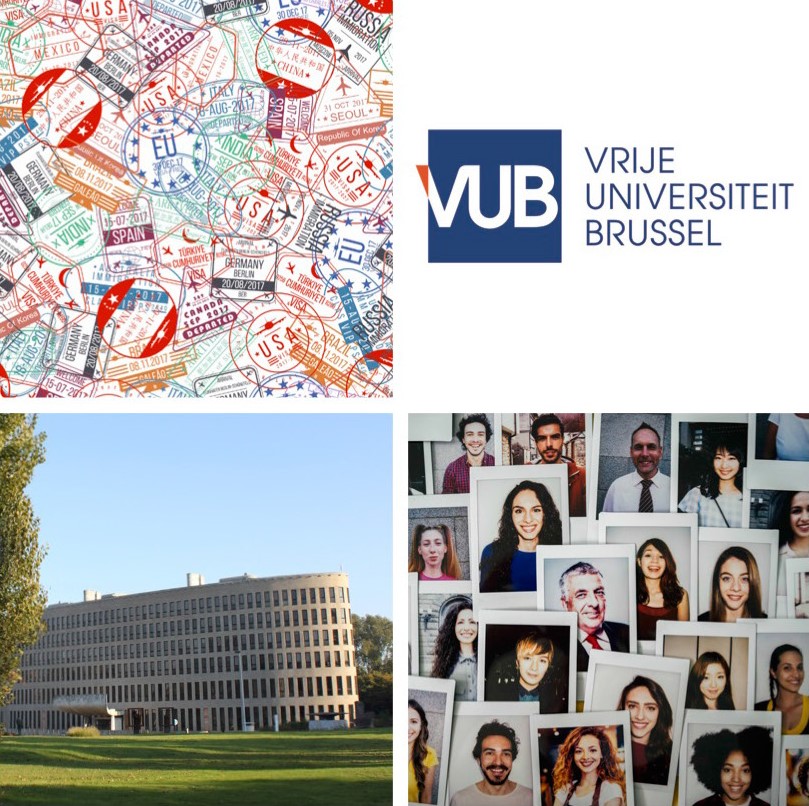Presentation of BIRMM VUB
Vrije Universiteit Brussel (VUB) conducts a wide variety of research on migration and diversity, spread over many disciplines, departments and research institutes. The application for institutional membership to IMISCOE has provided a catalyst for a long-discussed creation of an interdisciplinary research centre in which VUB migration and diversity researchers can meet, exchange and bundle forces.
This interdisciplinary group, called the ‘Brussels Interdisciplinary Research centre on Migration and Minorities (BIRMM)’ has therefore been created in January 2018. It joins over 60 researchers working on migration and diversity related topics, mostly in social sciences (sociology, political science, communication science, criminology), history, philosophy and law. The centre is located in Brussels, capital of Europe and second city world-wide with most foreign-born residents. BIRMM is coordinated by Prof. Ilke Adam and Prof. Florian Trauner (both political science professors at the Institute for European Studies of Vrije Universiteit Brussel) and a board of delegates with on one representative per research centre or department. The website of the new interdisciplinary research centre will be launched later this year.
BIRMM’s research can be divided into three broad research clusters:
1. The Multi-Level Governance of Migration, Equality and Diversity
BIRMM researchers inquire into when, how and why multi-level governance of migration, equality and diversity takes place. They respond to questions like: How and why do policies diverge across policy levels, across countries, regions, cities and over time? How and why do different levels of authority coordinate migration, diversity and equality policies? Research programmes in political science, political theory and law also focus on the political representation and participation of ethnic minorities and intersectional groups; and on human rights dimensions in migration law. This research cluster offers a.o. unique research foci on the (external dimension of) EU migration governance (Ilke Adam, Florian Trauner, Philipp Stutz and Leonie Jegen), the multi-level governance of immigrant integration in federal and decentralized states (Ilke Adam and Laura Westerveen), the quality of representation in diverse societies (Karen Celis, Silvia Erzeel, Eline Severs) and intersectionality in politics and policies (Karen Celis, Gily Coene, Sophie Withaecx, Ilke Adam and Serena d’Agostino). The BIRMM research domain on the multi-level governance of migration, equality and diversity benefits from its central location in Brussels, thereby profiting from the close-by European institutions to regularly organize policy-research dialogues with EU policy-makers and civil society organisations.
2. The Sociology of Migration, Equality and Diversity
BIRMM researchers in this cluster study the how’s and the why’s of immigrants' and ethnic minority citizens’ (un)equal participation in different societal spheres: education, labour-market, health, religion, communication, crime, politics and housing. While doing so, they focus on the study of mainstream institutions, the practices of every day discrimination, and features of the ethnic minority and majority populations. They particularly address the influence of the intersections of ethnicity/race with other discriminatory mechanisms like gender, age, religion, health status, handicap, class and sexuality. This research cluster offers a.o. unique research foci on migrant’s health (a.o Hadewijch Vandenheede and Wanda van Hemelrijck), methodological development in discrimination testing (a.o. Pieter-Paul Verhaeghe and Dounia Bourabain) and migrants and digital connectivity (Kevin Smets). Within this cluster, the VUB holds a Fatima Mernissi Chair in Gender and Islam (Iman Lechkar), not only promoting research on gender and Islam, but also building bridges between academia and civil society (opinion makers, civil society organisations, artists, activists and different types of stakeholders), thereby reaching a very large and diverse Brussel’s public.
3. Migration, Diversity and the City
BIRMM researchers in this cluster try to understand how formal and informal regulations developed to cope with these challenges influence patterns of integration and conflict, neighbourhood disintegration and urban renewal. This research cluster offers a.o. a unique research focus on city governance of migration and diversity in current and present times (19th century, a.o. Bas van Heur, Anne Winter, Nick Schuermans, Pieter-Paul Verhaeghe, Patrick Deboosere). Within this research cluster, active academia-civil society/policy dialogues are set up through the Brussels Academy, an ‘urban and citizens university on the city’. The Brussels Academy recurrently organizes the StadsSalonsUrbains lectures, joining a public or researchers, policy makers and civil society discussing a.o. the governance of diversity in cities.

